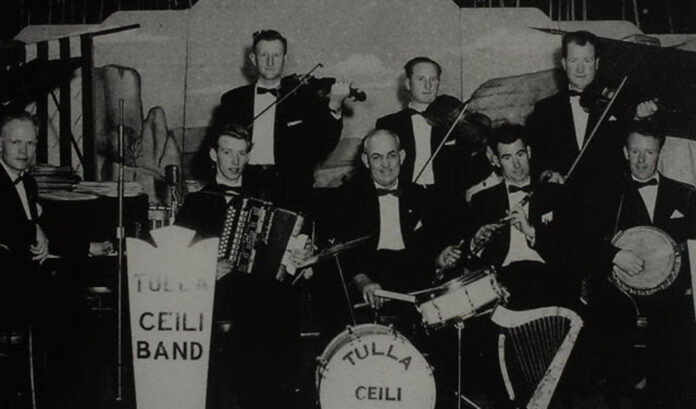AN hour-long bilingual documentary, to be broadcast on TG4 on St Stephen’s night, tells the remarkable story of the Tulla Céilí Band.
The Tulla Céilí Band tells the story of the band, which has been around for more than 70 years, and also offers a broader and more seamless social history of the times, revealing a tradition that has been handed down from father to son, along with exploring how this tradition was quite often slighted but yet continued to survive in an impatient and quickly changing environment.
Directed by John O’Donnell and narrated by Doireann Ní Bhriain, the film explores the Tulla Céilí Band, both past and present, and looks at how their particular style and sound was forged and maintained over the years.
When the band set out in 1946, no-one would have guessed that their unique sound would find a home in the hearts of many from Camden Town to Carnegie Hall, along with practically every dance hall and village throughout Ireland. Driven by youth, passion, enthusiasm, curiosity and, of course, a love of traditional music, they set out on an unplanned and turbulent journey that has spanned seven decades.
One very interesting aspect to the band is how they always seemed to reflect what was happening nationally. From the beginning, they too were plagued by a lack of financial security and the inevitable sense of emigration that loomed. Some of the musicians even used the band’s early trips to America in the 1950s as an opportunity to taste this new promised land and on many subsequent trips, at least one or two members remained behind.
In the early days, well-known musicians such as Paddy Canny, Joe Cooley and Willie Clancy played with the band but it was really PJ Hayes who kept the band together over the years, when many were forced to leave or emigrate. As a now infrequent member of the Tulla band, Martin Hayes makes the point about his father and the early band, who set out with an ambition to achieve certain goals, which they did successfully, as they were the first traditional Irish band to record an LP, as well as playing Carnegie Hall and all of this they took in their stride back in 1958.
Along with regular tours of America, they also played in the larger dance halls across England during Lent in the ’50s, ’60s and ’70s. It was these tours or pilgrimages in many ways that had the most profound wffect on the band and on the newly-arrived emigrants, as both suddenly recognised the power of this music, what it represented and what was being left behind.
To many people, the Fleadh Cheoils of the 1950s represented the heyday or golden era of céilí bands and in many ways they were but behind all of the joy and laughter at the Fleadhs, there was also a lonesomeness and a longing for what was lost or about to be lost in the shape of recently departed family members and friends. None of this was lost on the Tulla or the fact that the music that they played represented an “old Ireland” and one that many were embarrassed about and would much prefer to forget.
With contributions from well respected musicians and broadcasters, such as Kieran Hanrahan, Gearóid Ó hAllmhuráin, Áine Hensey and Joanie Madden, as well as the colourful historian Gearóid Ó Tuatháigh, the film gives a true flavour of the importance of céilí music not just in Clare but outside of the country too.
A native of Ennis, Colin McGann has been editor of The Clare Champion since August 2020. Former editor of The Clare People, he is a journalism and communications graduate of Dublin Institute of Technology.



